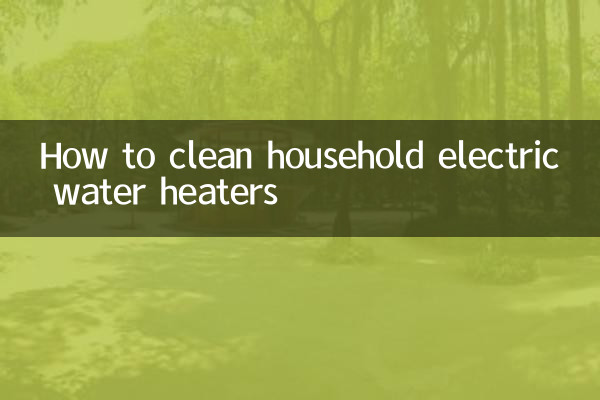How to clean household electric water heaters
Household electric water heaters are one of the indispensable appliances in the home. However, after long-term use, scale, bacteria and impurities can easily accumulate inside, affecting heating efficiency and water quality. Regular cleaning of your electric water heater can not only extend its service life, but also ensure water safety. The following is a detailed guide on cleaning electric water heaters that has been a hot topic on the Internet in the past 10 days.
1. Why should we clean the electric water heater?

1.Improve heating efficiency: Scale will adhere to the heating tube, reducing heat transfer efficiency and increasing power consumption.
2.Ensure water health: Water heaters that have not been cleaned for a long time can easily breed bacteria and affect your skin and health.
3.Extend service life: Regular cleaning can reduce internal corrosion and avoid failures.
2. Preparation work before cleaning
| Tools/Materials | effect |
|---|---|
| screwdriver | Remove the casing |
| wrench | Unscrew the drain outlet |
| bucket | discharged sewage |
| White vinegar or special cleaning agent | Dissolve scale |
| soft bristle brush | Clean the inner tank |
3. Detailed explanation of cleaning steps
1.Turn off the power and close the water inlet valve: Safety first, make sure the power supply is disconnected to avoid the risk of electric shock.
2.Drain the water tank: Open the drain outlet and drain all the water in the water tank.
3.Remove heating tube: Use a screwdriver to remove the heating pipe and check for scale accumulation.
4.Soak cleaning: Soak the heating tube in white vinegar or cleaning agent for 1-2 hours to soften scale.
5.Brush the liner: Clean the inner tank wall with a soft brush to avoid scratching the surface.
6.Rinse and install: After flushing with clean water, reinstall the heating pipe and drain outlet.
7.Water injection test: Open the water inlet valve, fill it with water and then turn on the power to check whether it is working properly.
4. Cleaning frequency recommendations
| Usage | Recommended cleaning frequency |
|---|---|
| Areas with hard water | Once every 6 months |
| Areas with better water quality | once a year |
| Frequently used (more than 3 people) | Once every 8 months |
5. Frequently Asked Questions
1.Can the cleaning agent be replaced with white vinegar?
Yes, the acidity of white vinegar can effectively dissolve scale, but it needs to be soaked for a longer time (more than 2 hours is recommended).
2.What should I do if the water heater smells strange after cleaning?
It may be cleaning agent residue. It is recommended to drain a bucket of water after multiple rinses or heating for the first time.
3.Will cleaning it myself damage the water heater?
As long as you follow the steps and avoid violent disassembly, there will generally be no damage.
6. Professional cleaning vs self-cleaning comparison
| Comparative item | self cleaning | Professional cleaning |
|---|---|---|
| cost | About 20-50 yuan (material fee) | 150-300 yuan/time |
| time | 2-3 hours | Within 1 hour |
| Effect | Suitable for light dirt | Thorough cleaning |
7. Precautions
1. Be sure to turn off the power when cleaning to avoid electric shock.
2. If the magnesium rod is seriously corroded (more than 50%), it needs to be replaced in time.
3. When using it for the first time after cleaning, it is recommended to drain it for 10 minutes before using it normally.
4. If the water heater has been used for more than 5 years, it is recommended to contact a professional for inspection.
Through the above steps, you can easily complete the cleaning work of household electric water heaters. Regular maintenance not only saves money on electricity bills, but also allows your family to use healthier hot water!

check the details

check the details